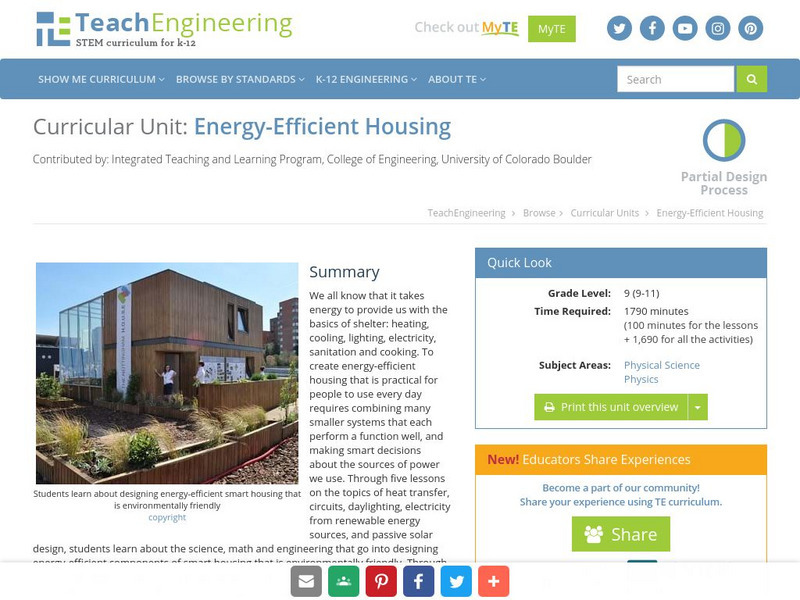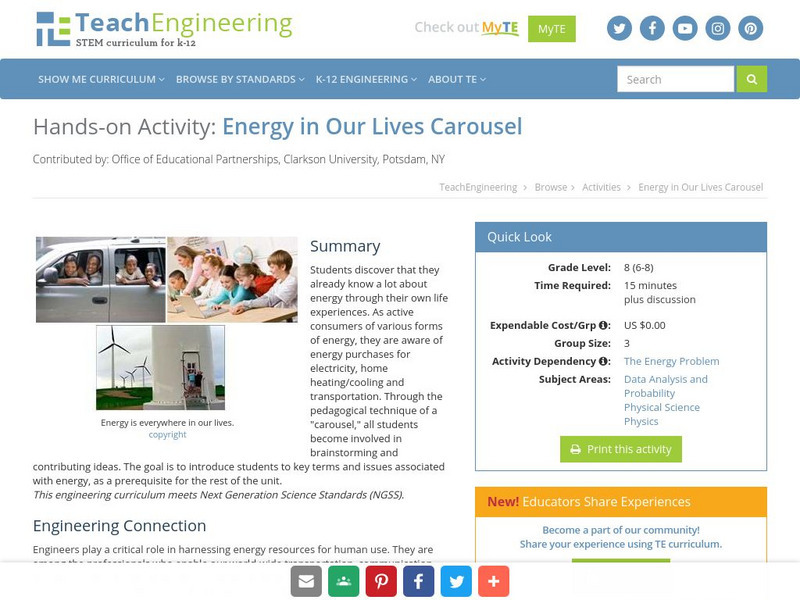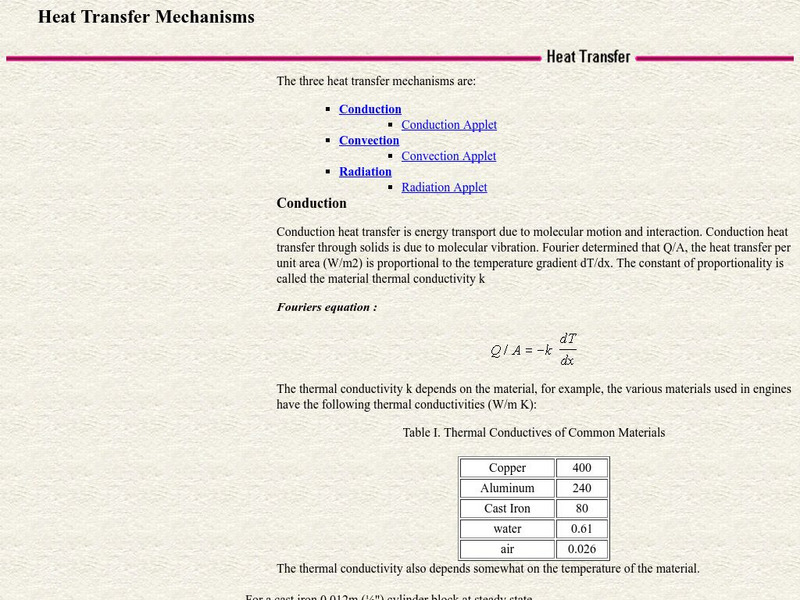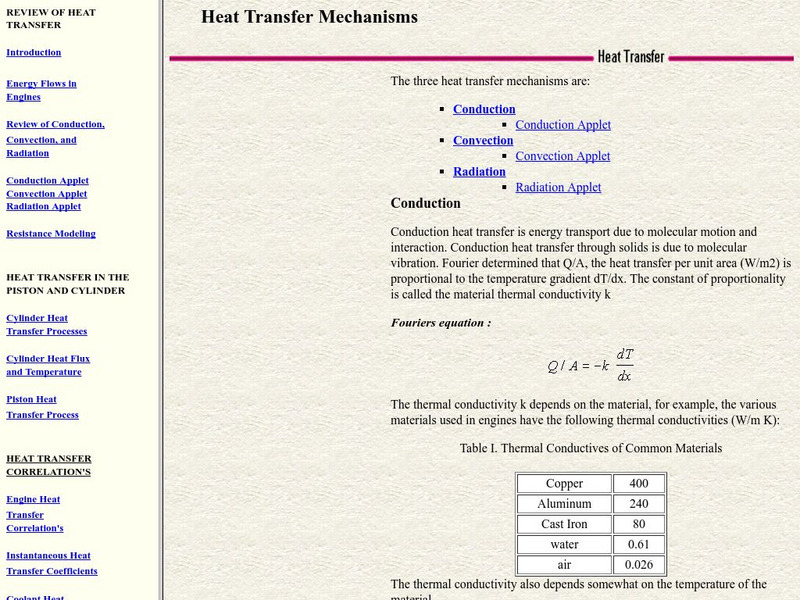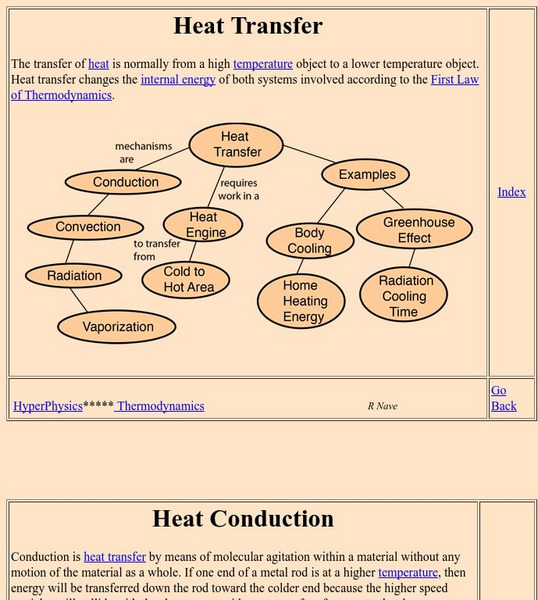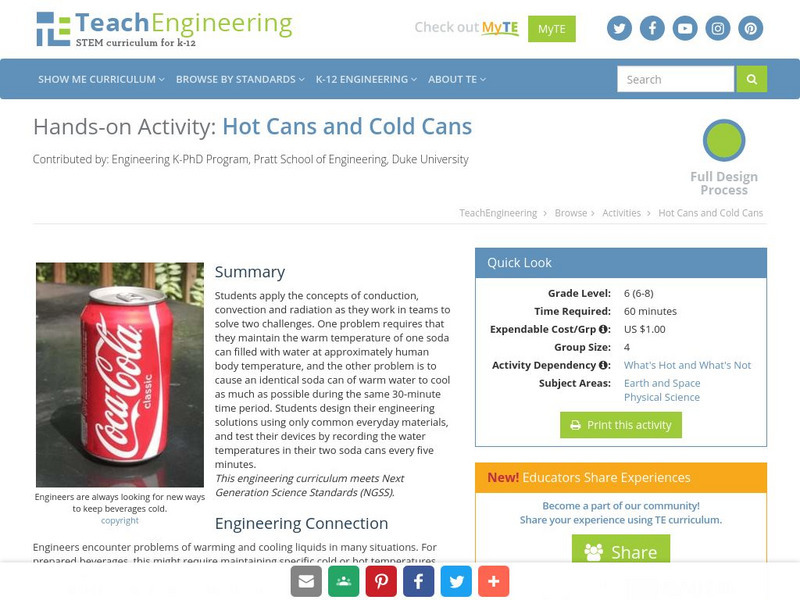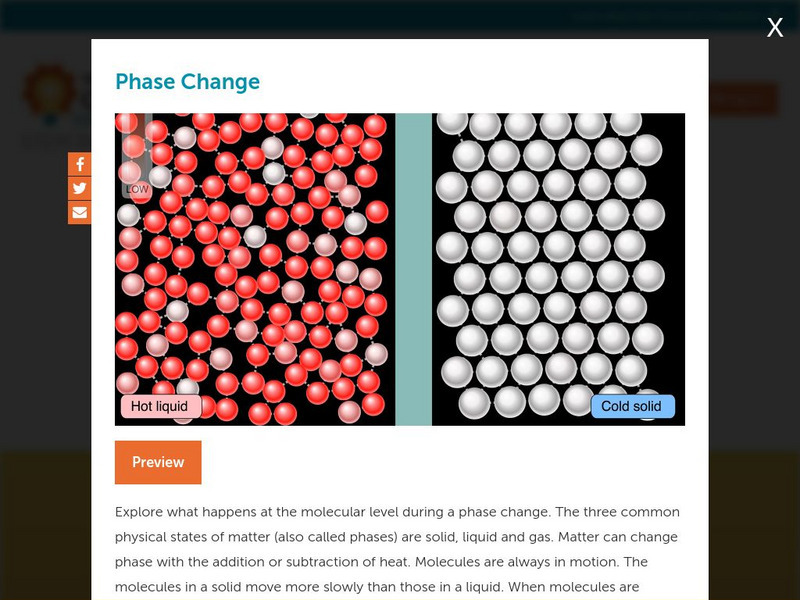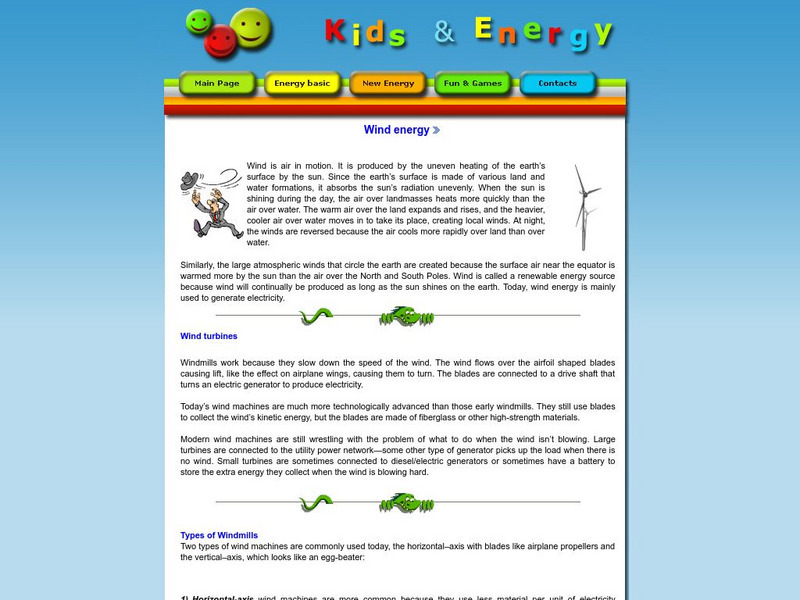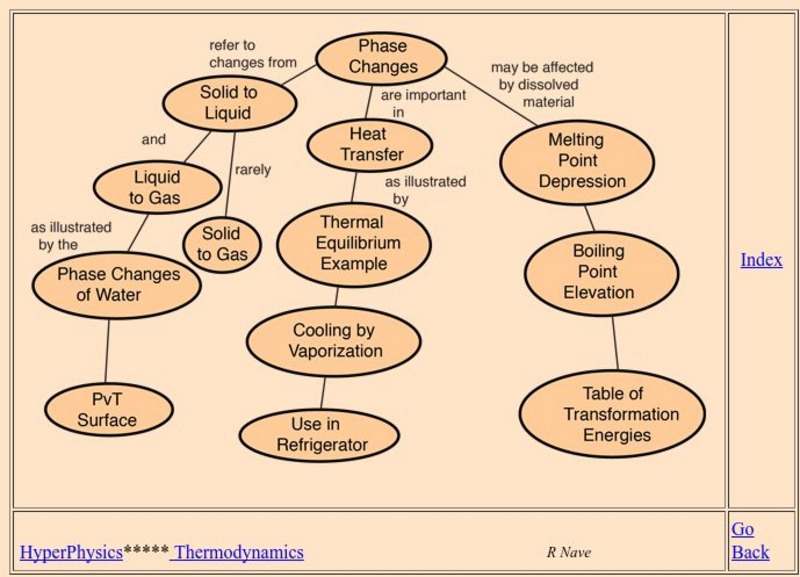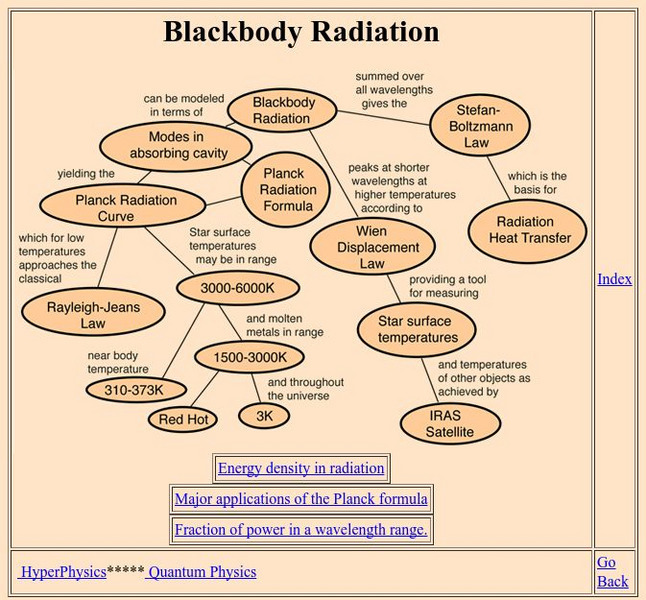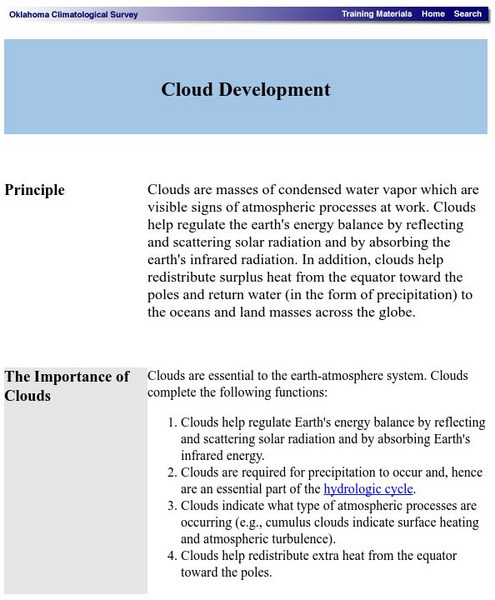TeachEngineering
Teach Engineering: Energy Efficient Housing
We all know that it takes energy to provide us with the basics of shelter: heating, cooling, lighting, electricity, sanitation and cooking. To create energy-efficient housing that is practical for people to use every day requires...
TeachEngineering
Teach Engineering: Energy in Our Lives Carousel
This activity is a way for students to discover that they already know a lot about energy through their own life experiences. As active consumers of various forms of energy, they are aware of energy purchases for electricity, home...
TeachEngineering
Teach Engineering: Conduction, Convection, and Radiation
With the help of simple, teacher-led demonstration activities, students learn the basic concepts of heat transfer by means of conduction, convection, and radiation. Students then apply these concepts as they work in teams to solve two...
Colorado State University
Csu: Heat Transfer Mechanisms
An excellent page from the Colorado State University with a heavy mathematical emphasis. Each form of heat transfer--conduction, convection, and radiation--is defined, compared, and contrasted. Mathematical equations governing the rates...
Colorado State University
Colorado State University: Heat Transfer Mechanisms
An excellent page from the Colorado State University with a heavy mathematical emphasis. Each form of heat transfer--conduction, convection, and radiation--is defined, compared and contrasted. Mathematical equations governing the rates...
TryEngineering
Try Engineering: Solar Structures
During this lesson, students will construct a passive solar house from everyday items then explore how the sun's energy is used to heat and cool it.
OpenSciEd
Open Sci Ed: 6.2 Thermal Energy Teacher Professional Development Overview
This four-day professional development session introduces teachers to the OpenSciEd materials generally in addition to the 6.2 Thermal Energy unit.
Other
Warmair.com: Programmable Thermostats
The virtues of programmable thermostats are discussed. Includes a section titled "Thermostat Set-back Calculation;" the visitor can enter the normal and an adjusted thermostat setting and an outdoor temperature and view the percent...
Science Struck
Science Struck: Conduction, Convection, and Radiation
Explains the concept of heat transfer and describes conduction, convection, and radiation which are the three modes of heat transfer. Includes formulas, examples, and applications.
American Chemical Society
Middle School Chemistry: Molecules in Motion
Slide the temperature gauge and see what happens to the movement of the molecules.
Georgia State University
Georgia State University: Hyper Physics: Heat Convection
Using understandable words and exceptional graphics, this page describes the transfer of energy by means of the convection process. Contains several links to related topics.
Georgia State University
Georgia State University: Hyper Physics: Heat of Fusion
The heat of fusion is defined and described. A graphical representation of the heat of vaporization is given. A method for measuring and calculating the heat of fusion is also presented and explained.
TeachEngineering
Teach Engineering: Hot Cans and Cold Cans
Students apply the concepts of conduction, convection, and radiation as they work in teams to solve two problems. One problem requires that they maintain the warm temperature of one soda can filled with water at approximately body...
Colorado State University
Colorado State Univ.: Heat Transfer Resistance Modeling
This site from the Colorado State University discusses the tranfer of heat by conduction and convection. Discussion centers around the application of these two heat transfer mechanisms to engines. The variables that effect the resistance...
Concord Consortium
Concord Consortium: Stem Resources: Phase Changes
This activity reviews of states of matter, then relates them to atomic movement as it is affected by attractions between atoms and the addition of energy. Latent heat and evaporative cooling are also topics covered. Multiple-choice and...
Georgia State University
Georgia State University: Hyper Physics: Zeroth Law of Thermodynamics
The principle of thermal equilibrium is discussed and explained. The zeroth law of thermodynamics is stated. Links to several other pages with related information are provided.
University of Sydney (Australia)
Thermal Physics Module/heat Transfer 1 [Pdf]
The first of two pages discussing the different forms of thermal energy transfer. Equations expressing the rate of energy transfer by each of the methods are provided and discussed.
Better Planet Productions
Earth Care: Movers and Shakers [Pdf]
Wind is created in areas where there are temperature shifts. For this lesson, Grade Two students will investigate areas of their schoolyard where there are 'wind tunnels' and 'wind shadows'. They will then use this information to...
Energy for Sustainable Development
Kinds and Energy: Wind Energy
Wind is air in motion. It is produced by the uneven heating of the earth's surface by the sun. Since the earth's surface is made of various land and water formations, it absorbs the sun's radiation unevenly. When the sun is shining...
Georgia State University
Georgia State University: Hyper Physics: Phase Change Concepts
An indexing page for the HyperPhysics site. This page includes links to a variety of pages at the site which contain information related to phase changes. Each individual page consists of informative graphics and clear explanations.
Georgia State University
Georgia State University: Hyper Physics: Blackbody Radiation
An indexing page for the HyperPhysics site. This page includes a concept map of links to pages that contain information related to blackbody radiation. Each individual page consists of informative graphics and clear explanations.
Other
Applied Thermodynamics: Heat Transfer
Heat transfer, rates of heat exchange,conduction, radiation and convection are defined and discussed at this site from Applied Thermodynamics. Well illustrated.
Oklahoma Mesonet
Oklahoma Climatological Survey: Cloud Development
This site explores the importance of clouds and how clouds are formed. Content details common atmospheric cooling mechanisms and atmospheric stability.
Other
Solar Cooking Archive
This website is brought to you by Solar Cookers International. You can view the site in English, German, Spanish, French, Italian and Portuguese. Check out how to build different types of solar cookers.
